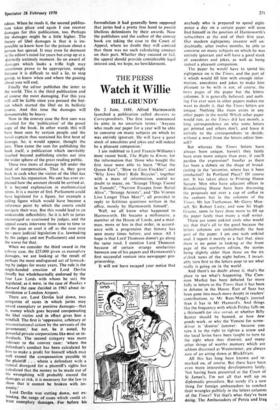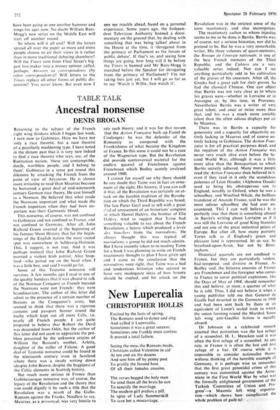THE PRESS
Watch it Willie
BILL GRUNDY
On 2 June, 1888, Alfred Harmsworth launched a publication called Answers to Correspondents. The first issue announced its aims in no uncertain terms: 'Anyone who reads our paper for a year will be able to converse on many subjects on which he was entirely ignorant. He will have a good stock of anecdotes and jokes and will indeed be a pleasant companion.'
I am indebted to Lord Francis-Williams's most recent book, The Right to Know, for the information that 'those who bought the first issue were able to learn "What the Queen Eats", "How to Cure Freckles", and "Why Jews Don't Ride Bicycles", together with a mass of information, useful no doubt to many, on "Strange Things Found in Tunnels", "Narrow Escapes from Burial Alive", "Strange Arrests", and "Do Women Live Longer Than Men?", all provided in reply to fictitious questions written in the office, mostly by Harmsworth himself.
Well, we all know what happened to Harmsworth. He became a millionaire, a member of the House of Lords, and a mad- man, more or less in that order, in accord- ance with a progression that history has seen many times before, and since. All I hope is that Lord Thomson doesn't go along the same road. I mention Lord Thomson because of certain strange similarities between one of his papers and Harmsworth's first successful venture into newspaper pro- prietorship.
It will not have escaped your notice that
anybody who is prepared to spend eight- pence a day on a certain paper will soon
find himself in the position of Harmsworth's subscribers at the end of their first year. Our modern eightpenny investor will un- doubtedly, after twelve months, be able to converse on many subjects on which he was entirely ignorant and will have a good stock of anecdotes and jokes, as well as being indeed a pleasant companion.
The paper he would have to spend his eightpence on is the Times, and the part of it which would fill him with enough infor- mation, anecdotes and jokes to make him pleasant to be with is not, of course, the news pages of the paper but the letters columns. It is generally believed, and noth- ing I've ever seen in other papers makes me want to doubt it, that the Times letters are unique. Nothing like them exists in any other paper in the world. Which other paper would run, as the Times did last month, a long correspondence on why some letters get printed and others don't, and leave it entirely to the correspondents to decide, without a word from the letters editor him- self?
But whereas the Times letters have always been unique, haven't they lately been even more unique than ever, if you'll pardon the expression? Insofar as there has been a debate on the shape of broad- casting in the 'seventies, where has it been conducted? In Portland Place? Of course not. It has taken place in Printing House Square. Men who have adjacent offices in Broadcasting House have been discussing the proposals not over a cup of coffee in the canteen but in the columns of the Times. Mr Ian Trethowan. Mr Gerry Man- sell, Sir Robert Lusty, and now Sir Hugh Greene. seem to have done more to fill up the paper lately than many a staff writer.
There are some unkind souls who would say that that's all to the good because the letters columns are undoubtedly the best part of the paper. I am one such unkind soul. I report it merely as a fact that, since there is no point in looking at the front page of the northern edition, the stories being slightly older than those on the six o'clock news of the night before, I invari- ably turn first to the letters page to see what really is going on in the world.
And there's no doubt about it: that's the place to see what's happening. The Com- mon Market has been debated far more fully in letters to the Times than it has been in debates in the House. East of Suez has been gone into much more deeply in readers' contributions to Mr Rees-Mogg's journal than it has in Mr Hansard's. And things like the frequency with which Friday falls on a thirteenth (or vice versa), or whether Billy Bunter should be banned, or how dew ponds work, or why the Yemeni for screw- driver is 'dismiss' (answer: because you turn it to the right to tighten a screw and the local levies have been taught to turn to the right when they dismiss), and many other things of worthy memory which are seldom discussed at Westminster, are always sure of an airing down at Blackfriars.
All this has long been known and re- marked on, of course. But there have been even more interesting developments lately.
Not having been presented at the Court of St James's. I'm not all that well up on
diplomatic procedure. But surely it's a new thing for foreign ambassadors to conduct their wrangles publicly in the letters columns of the Times? Yet that's what they've been doing. The Ambassadors of Persia and Iraq
have been going at one another hammer and tongs for ages now. No doubt William Rees- Mogg's new series on the Middle East will start off another round.
So where will it all end? Will the letters spread all over the paper as more and more people choose to air their views in it rather than in more traditional debating chambers? Will the Times turn from Fleet Street's big- gest loss-maker into a money-spinner called, perhaps, Answers to correspondents (by other correspondents)? Will letters to the Times replace all other forms of public dis- cussion? You never know. But even now I can see trouble ahead, based on a personal experience. Some years ago, the Indepen- dent Television Authority banned a docu- mentary on the ground that, by dealing with something that was being talked about in the House at the tune, it 'derogated from the primacy of Parliament as the forum of public debate'. If that's so, and seeing how things are going, how long will it be before the Times is banned and Mr Rees-Mogg is marched before the Speaker for derogating from the primacy of Parliament? I'm not taking bets just yet, but I will go so far as to say 'Watch it Willie, Just watch it'.



































 Previous page
Previous page